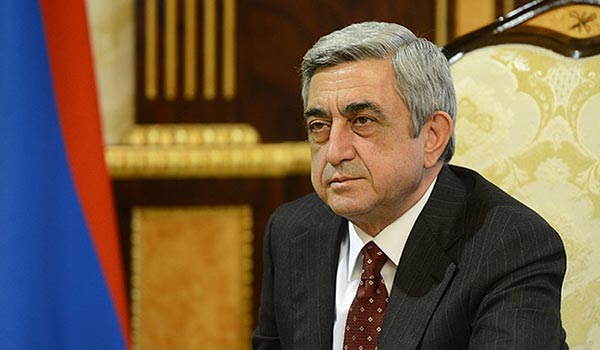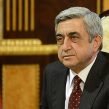
Armenia Recalls the Zurich Protocols
Publication: Eurasia Daily Monitor Volume: 12 Issue: 40
By:

On February 16, the Armenian President Serzh Sargsyan addressed a letter to the speaker of the National Assembly, Galust Sahakyan, informing him about an executive decision to recall the Armenia-Turkey Protocols from the parliament. Signed in Zurich, in 2009, under the mediation of the United States, the Protocols would have, inter alia, established diplomatic relations between Ankara and Yerevan as well as re-opened the countries’ mutual border. However, Turkey never ratified the agreement following pressure from Azerbaijan, and the Protocols have been awaiting ratification in the Armenian parliament ever since (see EDM, April 27, 2010; March 17, 2011). Justifying his sudden decision to recall the document from the legislature, President Sargsyan’s letter pointed to “the absence of political will [in Ankara to ratify the Protocols], distortions of the letter and spirit of the protocols by the Turkish authorities and continuous attempts to articulate preconditions.” In his letter, Sargsyan added, “on the eve of the Armenian Genocide centennial the Turkish policy of denialism and history revision has been intensified” (President.am, February 16)
The following day, Deputy Foreign Minister Shavarsh Kocharyan gave an interview to the Public Television of Armenia and argued that the Armenian head of state’s declaration was quite logical after Turkish President Recep Tayyip Erdogan launched the initiative to commemorate the 100th anniversary of the Battle of Gallipoli on April 24 (Mfa.am, February 17). Though the recall of the Zurich Protocols from the parliament was generally positively received by Armenian society, some circles both in Armenia and in the ?rmenian diaspora have advocated that Yerevan take an even tougher stance. The Armenian Revolutionary Federation (ARF) Bureau member Giro Manoyan has said that “this is a welcome step, but is not enough: it is necessary to completely neutralize [nullify] and recall the signatures” (Armenianweekly.com, February 16).
President Sargsyan had previously sent out invitations to world leaders to commemorate, in Yerevan, the 100-year anniversary of the tragic events of 1915. Moreover, in August 2014, the official invitation was handed to Erdogan personally by Armenia’s minister of foreign affairs, Edward Nalbandian. However, the Turkish president has not only rejected the invitation, but also appears to be undermining the Armenian initiative. In his turn, Erdogan has invited all world leaders to attend the 100th anniversary of the Battle of Gallipoli, the famous World War I military campaign initiated by the Allied Forces against Ottoman troops in 1915. Annually, the commemoration takes place on April 25; but this year, Turkish authorities decided to organize the event on April 24, when Armenians will commemorate their own nationally important centenary. In other words, Erdogan’s actions can be interpreted as an attempt to prevent world leaders from visiting Yerevan and for Turkey to dodge international pressure being incited by Armenia. So far, Azerbaijani President Ilham Aliyev and British Prime Minister David Cameron have already accepted Erdogan’s invitation; meanwhile French President Francois Hollande plans to attend the Yerevan events.
In its penultimate point, the Declaration of Independence of Armenia (August 23, 1990) professes that “The Republic of Armenia stands in support of the task of achieving international recognition of the 1915 Genocide in Ottoman Turkey and Western Armenia” (Gov.am, accessed March 4). And Yerevan has pursued this foreign policy goal since the breakup of the Soviet Union. However, the inclusion of this issue in Armenia’s foreign policy agenda provoked a negative reaction in Turkey. Along with the 1988–1994 war over Karabakh and this region’s continued unresolved status, Armenian demands on Turkey’s historical accountability are the second key reason for Ankara and Yerevan’s strained ties, the lack of bilateral diplomatic relations, as well as the continued closure of the Armenian-Turkish border.
Despite the absence of diplomatic relations, the upcoming pair of hundred-year anniversaries have intensified Armenia and Turkey’s indirect channels of communication. Back in 2011, the Armenian government established the “State Commission on the Coordination of Events Dedicated to the 100th Anniversary of the Armenian Genocide.” Chaired by the president of Armenia, the Commission has promulgated a pan-Armenian declaration, according to which Armenia intends to file legal claims as a point of departure in the process of restoring individual, communal and pan-Armenian rights and legitimate interests in Turkey (President.am, January 29). Undoubtedly, such a promotion by Armenia of legal claims against Turkey will provoke new tensions between these two neighboring states, as well as in world politics more generally. Up to now, Armenian authorities had never presented any comparable legal claims against Turkey; so this new approach, which has now been followed by Sargsyan’s official recall of the Zurich Protocols, will likely have serious reverberations in Turkey.
These ongoing processes have coincided with the first hearing of the Swiss appeal in the case of “Perincek v. Switzerland” (Al-monitor.com, January 30). The ruling, made in 2013 by the European Court of Human Rights, concerns freedom of expression of Dogu Perincek, a Turkish academic, lawyer and the Chairman of the Turkish Workers’ Party. In these hearings, Armenia and Turkey are represented as third parties, therefore the Swiss appeal is widely perceived as a kind of legal battle between the two states.
Notably, the number of states and international organizations that legally recognize the events of 1915 as a “genocide”—rather than some lesser or undefined tragic incident—continues to grow. It has been recognized by 23 countries, including Russia, France, Germany, Italy and Canada, as well as 43 US states. Moreover, the issue is gradually becoming a matter of wider public scrutiny in Turkish society itself. Obviously, as the commemoration date of April 24 approaches, Armenian-Turkish relations will remain strained and rocky.




